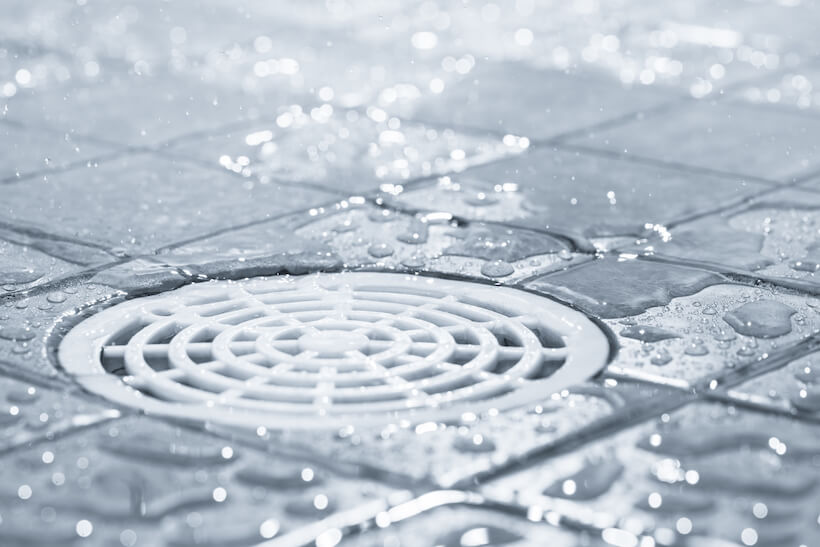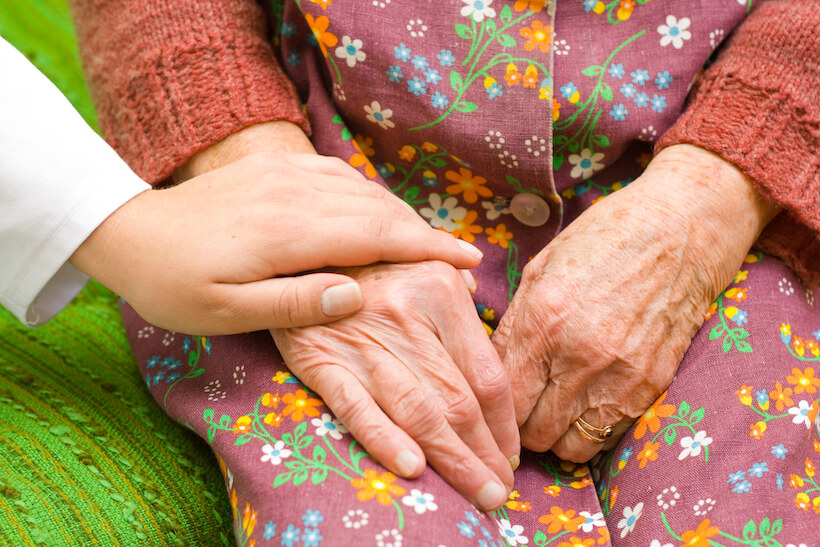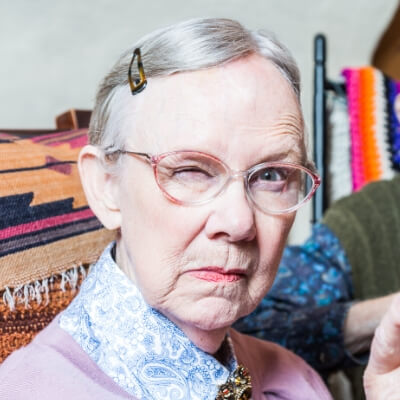Top Dementia Caregiver Tips & Tricks
Tips from dementia caregivers on bathtime, meals, hydration, toileting, and more.

Caring for my mom with Alzheimer’s definitely ranks as one of the hardest things I’ve done. And it keeps getting harder.
With her cognitive and physical abilities declining, the caregiver time commitment keeps increasing. That means carving more and more time out of my already overbooked life.
It can feel overwhelming… and isolating, because unless you’re a past or present caregiver you don’t understand how all-consuming caregiving can be.
The lonely factor is real.
But you know what? We are not in this alone.
The World Health Organization reports there are currently around 50 million people living with dementia.
And you know what that stat says to me? All those people currently have or are going to have caregivers.
So no matter what dementia struggle you are facing today, there’s someone who came before you who dealt with it and maybe even figured out a way to make it more manageable. And what’s even more encouraging is that most caregivers are more than willing to share their tips and tricks with those of us in the dementia caregiving trenches.
I asked the Adventures of a Caregiver community to share their best caregiving tips so I could share them with you. The response was overwhelming. ❤️ I’m still going through all the info that was shared, but here’s a start.
Dementia Caregiver Tips
Bathtime Tips for Dementia Caregivers

Why are showers a struggle for many seniors living with dementia? Fear, discomfort, and modesty are a few of the many reasons bathtime can become a battle.
So what do you do when your parent refuses to bathe?
Here are some suggestions from experienced caregivers to make this difficult situation more manageable.
- Plan bath time early to mid-day when minds are sharper.
- Do an activity like gardening or cooking before bath so you can say, “Great work! We better go get cleaned up now.”
- Try calling bath time “spa time”.
- Say the doctor called and said you have to shower. ?
- Make sure the bathroom is warm.
- Install grab bars to reduce the fear of falling.
- Get a shower chair and a handheld sprayer.
- Some seniors have a fear of falling into the drain. Try putting a towel on the floor of the shower to ease this fear.
- Let your senior do as much of the bathing as she can do herself. Only help when needed.
- Shower from the feet up. It may be less shocking to the system.
- Water from the shower can feel like needles on tender, thining skin. Try adjusting the showerhead or wand to a gentle flow. Wash gently.
- Use a towel to cover your senior’s shoulders (and lap if using a shower chair) to keep her warm and maintain as much privacy as possible.
- Try a terrycloth robe to step into after the shower. It’s warm and does most of the drying for you.
- In lieu of a full bath or shower, try disposable washcloths like THESE. They are microwavable, do not require rinsing, and are disposable. ?
- Break down bathing over several days. “Here’s a washcloth, Mom. Just give your armpits a quick wipe.” or “Let’s wash your hair in the kitchen sink.”
Meal and Hydration Tips for Dementia Caregivers

Eating and drinking are other topics that cause challenges for seniors living with dementia and their caregivers. Poor nutrition and hydration can cause a host of problems, so it’s important to see your doctor for medical advice for any concerns you have about your senior’s food or liquid intake. The tips in this post are suggestions from caregivers, not medical professionals, and therefore are in no way medical advice.
Meal Tips
- If your senior is able, let her participate in meal planning or preparation.
- Try to make the meal smell and look appealing.
- Don’t put too much food on the plate at a time. Use small plates with small portions.
- Try red plates. I know it sounds strange, but researchers have found that seniors may actually eat more if served on red plates. You can read about the Red Plate Study here. These may be especially helpful in the later stages of dementia.
- It can take a while for someone with dementia to eat or realize it’s mealtime, so be sure to give adequate time. But if the food gets cold, warm it up.
- Plate guards can be a huge help if your senior has trouble getting food onto a fork or spoon.
- Sleepy seniors don’t usually eat much. Plan meals when rested and awake.
- Food tastes may change. Your senior may develop new food preferences. Sweets and food with strong flavors may become more appealing.
- Eat with your senior.
Hydration Tips
- Boost water intake by mixing with juice. Gradually increase the amount of water while reducing the amount of juice.
- Use small cups. Large ones can seem overwhelming.
- Drink with your senior.
- Have a tea party.
- Add a fun garnish to the cup.
- Try serving sparkling water in champagne or wine glasses.
- Play a drinking game with shot glasses of water.
- Offer foods high in water content like smoothies, fruit, soups, and milkshakes throughout the day.
Toileting and Incontinence Tips for Dementia Caregivers

Poop.
Yep, I said it.
It’s not a fun topic but when you’re caring for someone living with dementia, dealing with it is pretty inevitable. So here ya go.
- Keep the door to the bathroom open so your senior can see the toilet, or put a sign on the door.
- Keep the light on in the bathroom all the time.
- Carry extra clothes, supplies for clean-up, and a plastic bag whenever you take your senior out.
- Once accidents begin, try implementing a toileting schedule (about every 2 hours).
- Disposable briefs are not foolproof. Protect furniture with vinyl covers for easy cleanup.
- For seniors who are bedridden, cut nightgowns halfway up the back. This allows your senior the dignity of being in her own gown while making changes easier.
- At night, keep a lift sheet/towel under your senior for easy brief changes you can do in bed.
- Triple Paste diaper cream is a fantastic barrier cream.
- Garden baskets fit at the end of most beds hospice provides. Use them to keep wipes, briefs, diaper cream, and gloves in easy reach.
General Tips for Dementia Caregivers

- Dementia changes everything.
- Choose your battles.
- Talk to an elder lawyer as soon as you know your senior has dementia.
- Telling your senior “the doctor said” can save the day.
- To prevent driving try disabling the car – disconnect the battery.
- Arguing never works, in fact, it usually makes the situation worse. (See my post on dealing with mean Alzheimer’s behaviors here. When Dementia is Mean)
- If your senior refuses/complains about taking medication, try taking your medication at the same time.
- Create an activity plan for your senior to keep them busy and engaged. See this huge list of activity ideas HERE.
- Keep your senior on a schedule/routine.
- Sleep while they sleep.
- Get your senior a Day Clock.
- Music can work miracles.
- Electronic pillboxes can be helpful aids with medication in the earlier stages.
- Door alarms can be a lifesaver.
- Talk slowly when speaking to someone with dementia.
- Remember that Alzheimer’s and Dementia patients have tunnel vision. Stay in their line of sight before doing care.
- Use a large calendar for activities and events like church, lunch out, activity day, shopping, etc.
- Resist trying to make your senior face reality. Meet them where they are.
- Loud noises, flashing lights, touching things, and sometimes food textures can be overwhelming and cause behavior issues.
- A little therapeutic fibbing goes a long way.
- This disease is mean.
- Find some humor every day.
- Self-care – whatever that means to you.
- Call the Area Council on Aging periodically and ask for help.
- Adult day programs.?
- If your senior with dementia is a veteran or the spouse of a veteran, check if they qualify for the Veterans Aid and Attendance Benefit.
- Teepa Snow! ? Find her YouTube channel HERE.
- Use a dry erase board to remind your senior of worrisome things. (Everyone is ok. Your money is safe. Today is Tuesday.)
- Take a quick step outside to get a breather when it gets too stressful.
- Hospice is wonderful. Call them earlier than you think.
- Get a support system. Don’t try to do this alone.
If you have any tips to share with other caregivers, please drop them in the comments.
Do you need something for your senior with dementia to do? I’ve been there, too! Subscribers to my free email newsletter get access to my subscriber-only Resource Library with dementia activity ideas and printables. You can join with the form below!










I am a caregiver for my husband. Thank you for those tricks n tips. I have used some of them. Good to know I am on the right path. Blessings..
I take care of my Mom.
Tips I’ve learned.
1. I have small night light in her room that only comes on when it gets dark. It keeps her from becoming scared. I also placed them throughout the house. Creates a soft glow.
2. I installed with velcro small lights in the hallway leading into the bathroom that come on with movement. Lights thenway at night without turning on bright lights. I also have them in the bathroom. To help with night time potty.
3. I tried disposable chux for the bed, but they crunch up too much and ita uncomfortable. So I purchased 2 washable pads that are the huge. Now we can use these and if there is an accident, we can quickly change it out with the extra one and not damage the sheets or mattress.
4. At night I put a night time pull up and an pair of soft plastic underwear on my Mom. This has really cut down on accidents and allowed her and I to sleep through the night. Again, buy 2 so u can use one and have a backup.
5. Drinking fluids. My Mom had trouble with choking. I got her some colorful sippy cups and took out the suction part. She loves the colors and now drinks her fluids with ease. Plus, if it falls, it decreases the amount that spills.
6. For dinner, she does better with finger foods, she loves mini meatballs mixed with all kinds of ground up veggies. She also does well with mini tortellini. I get her flavored milk that is high in protein. She also drinks a mixture of water, cranberry juice and gatorade. Equal parts. Keeps her electrolytes in balance.
It is a challenge to be a caregiver, but if you keep it in perspective and remember they arent doing this to upset you, they have no control. Plus, I attend a monthly Alzheimer’s support group.
One day at anytime and love them as much as you can. Compassion and gentleness goes along way.
God bless
Cheryl
Hi Cheryl, Great tips! Thanks so much for sharing! Anne
Great article. Have one additional bathing tip, use bath body wraps with Velcro (I like this one… Turquaz Linen Lightweight Knee Length Spa/Bath Waffle Body Wrap with Adjustable Touch Fastener (Large, Gray) https://www.amazon.com/dp/B077LFZYWL/ref=cm_sw_r_cp_tai_epnvEbFHY4A6V ). We start the shower with one on that gets wet and when done I have my MIL drop it in the shower while I’m putting a dry one on. Then she is never fully exposed during the entire process. It works great!
Hi Nancy, Great tip! Thanks so much for sharing! ❤️
I have found that taking my charge to store to sample scents of body washes was key. We found one she liked while I was shopping for me, and she loves the scent. I remind her when it’s time for a bath, oh let’s go use that lovely scented xxxxxx . Afterwards I compliment her how the scent jjust makes the room smell so luscious. Crossing my fingers that this continues for awhile. Sometimes I could just a full shower in once a week, now it’s almost every day.
Hi Kathy, What a great idea! Thanks so much for sharing! Anne
This is a great tip sheet. If I was a family carer I would print this out and put it on the wall so that
I could refer to it if I were struggling. Many thanks.
Thank you, Maddy, for stopping by my site! Anne
This is a Godsend! Us caregivers are doing on the job training 24/7 for years and need all the tips and tricks we can get. I have new respect for nurses and those who do this for a career. It’s not easy and is stressful, but we must remember our loved ones are struggling and these are their final years. The least we can do is make them comfortable and as enjoyable as possible then we can remember the good times.
Hi Karen, Thanks so much for stopping by my site and your kind words. ❤️ Anne
Thank you Anne! These are great tips! I just became a caregiver in Decatur, MI and I love it- but it’s not easy! I get super attached and I have a lot of learning to do still!
Hi Mia, I hope the tips are helpful to you! Anne
Hi,
Thank you for your article and helpful tips. I am the care giver for my husband and it is always a battle to get him to shave does anyone have any ideas on how to make this any easier?
Thank you for your help
I’m taking care of Dementia patient Stage 5. A few tips to share.
1. Anti slip foam lay on the bathroom floor is a must.
2. Our body remember the activities we allways like to do. Try to know these activities & get the patient to do it.
3. Try to have a fix routine. Esp toileting & eating. Now my patient follow almost a fix routine.
4. Try to know the patient trauma inciddent. They allways say the same thing over & over again. By knowing the incident, we can calm down the patient.
Most days my Dad does not shave. I have found that taking him to a Barber every couple of weeks for a hot shave with a straight razor is a treat he enjoys.
You made a good point that the definition of self-care can differ from person to person. I’d like to find a good dementia support service soon because I’d like to reduce the likelihood of my grandmother experiencing memory lapses. Delaying memory loss problems as much as possible would be crucial for that.